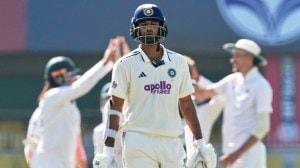Has Musharraf’s heart changed? And why?
The collapse of the Soviet Union threw our foreign and defence policies into a spin. With great, and invisible, skill Narasimha Rao landed t...

The collapse of the Soviet Union threw our foreign and defence policies into a spin. With great, and invisible, skill Narasimha Rao landed these on their feet. He initiated the first steps for India to ‘‘look East’’. He strengthened relations with Iran. He opened a line to the Northern Alliance in Afghanistan…
But as a sort of iron-ball tied to the legs, Pakistan continued to hold both our foreign and defence policies down. Not just that: even as it continued to send terrorists to kill and maim in India, it continued to be propped by its patrons — the US, China, Saudi Arabia. This immobility is what confronted Atal Behari Vajpayee and his senior colleagues as they took office. They saw that as long as India remained tied down to Pakistan it would not be able to play any significant role in world affairs — that whatever it said even on Pakistan, for instance about cross-border terrorism, was liable to be discounted — ‘‘Oh, that is the usual stuff — just India and Pakistan making allegations against each other.’’
They decided on a many-pronged response:
• Accelerate growth, in spite of what Pakistan is doing — apart from other things, this will in the end register with the people of Pakistan.
• Strengthen relations with a number of other countries and regions — Central Asian Republics, ASEAN, others.
• Ensure continued military superiority so that, should Pakistan lunge at India, it can be roundly defeated.
But the backing that Pakistan received from the US and China remained — of course, it also got much succor and morale boosting from countries in the Middle East: but these would in the end be influenced by what the US did. It was, therefore, necessary not just to outgrow and out-gun Pakistan, India had to outflank it. Three judgements, and a set of fortuitous events set the course.
The first point was evident: Pakistan is a dependent State. It cannot function without the help of the US, China, etc. The second insight seemed more of a conjecture at the time: while the US today remains transfixed by China, the reasoning went, sooner or later it will begin to see that the main threat to it 15-20 years hence will come from China — it will, therefore, look for possible counters to the growing power of that country. The third point concerned China itself: ever since the collapse of the Soviet Union, its apprehensions have centered around the US — it has long been convinced that the US is out to ‘‘contain’’ it, and that countries like India are the ones the US will yoke as instruments for this purpose.
Hence, the reasoning went,
• Engage the US.
• That will get China to re-examine its stance towards South Asia.
• These tectonic shifts will narrow Pakistan’s options.
The fortuitous events that helped were 9/11, and the continuing attacks by Pakistani terrorists in India. The US experienced first hand what India had been saying for so long — that Pakistan had become the University of Terrorism, that Taliban and terrorists of other hues were not the cause of what was happening; they were the result of the progressive Talibanisation of Pakistan’s State and society over 50 years. We had been repeating all this for years. To little avail. Secure in distant lands, American policy-makers couldn’t care two hoots. I well remember, and the day is not that long ago, when visiting diplomats and security and intelligence personnel from the USA, told about the way Pakistan was arming, training, financing, giving sanctuary to terrorists to kill and maim in India, would ask, ‘‘But where is the proof?’’
I would sigh with the poet,
Ai baad-e-balaa unko bhi zaraa, do chaar thapede halke se
Jo log abhi tak saahil se toofan kaa nazaaraa karte hain…
(Oh, strong and contrary wind, a blow or two, gently, to them too, Who from the comfort of the shore survey the storm…)
9/11 changed the standards of proof that were necessary!
As a result, events have taken the course that was envisaged by Vajpayee and his core team. Over the last five years, important segmets of the US policy establishment have begun to voice the apprehension that 15-20 years from now China will indeed be a potential threat to US interests, and that a country like India is among the few that can be a counter-weight in this region to an ever-stronger China — Mapping the Global Future put out by the National Intelligence Council1 is representative of such assessments.
On the other side, the steps that the US and India took towards dialogue and cooperation indeed registered in Beijing. It has in turn made a few overtures to ensure that India does not make itself available to the US as an instrument in the way that, in China’s assessment, it had made itself available to the USSR.
The result is the Musharraf of the changed heart. ‘‘Phir wohi dil nahin laya hoon,’’ he said during his visit to Delhi in April 2005. ‘‘Main naya dil laya hoon.’’
Our press was, as usual, swept off its feet: ‘‘Man of the match: Musharraf’’; ‘‘Laid bare: Perrez’s ‘new heart’’’; ‘‘Sunday win for both, one-day win Pak bonus’’; ‘‘General peaces it together’’; ‘‘Musharraf hits it out of Kotla.’’
This was customary hyperbole. But there was some incidental confirmation — from the ideologues of jihad in Pakistan, even from some of the mainline commentators.
Musharraf ‘‘has crossed all limits in appeasing India’’, Professor Hafiz Saeed, the founder of the Lashkar-o-Toiba told Nawaiwaqt and the staff of his own Jama’at ud-Dawa. The so-called confidence building measures that Musharraf is taking depart from the ‘‘principled position’’ that Pakistan has maintained on the Kashmir issue all through, he charged. The statement that Musharraf has agreed to disregard the UN Resolutions which have been the very foundation of Pakistan’s stand on Kashmir. Apart from everything else, the steps to build confidence and the statement foment distrust between the Kashmiri and Pakistani people, Saeed maintained. Building confidence with India while fomenting distrust with our own people is not wisdom, he said.
Four militant groups declared in a statement that Musharraf has ‘‘sold out Kashmir for trade and tourism’’. ‘‘This is the first time in Pakistan’s history that a Head of State has given in to India,’’ they declared. ‘‘We will not give up jihad till Kashmir becomes free.’’
General Hamid Gul was as upset. He declared: ‘‘The Indo-Pak joint statement indicates that our Government has lost its destination and position on the Kashmir issue. The text of the statement says that we are ready to hand over even Azad Kashmir to India instead of acquiring Kashmir. It seems that Azad Kashmir will be destroyed… We have deviated from our position. It will yield a dangerous result…
‘‘It is very sad for us that this decision has been taken by a ruler who is an Army man. This is the Army which has kept the Kashmir issue alive to achieve self-determination. But by ignoring the sacrifices of the Pakistani Army and the Kashmiri people, pro-Indian decisions are being accepted now. This declaration neither represents the aspirations of the Kashmiri people nor does it reflect the sentiments of the Pakistani people. It is nothing but a fraud.’’
Aijaz Afzal, the head of the Jama’at-e-Islami in POK was no less minatory. He said that ‘‘Musharraf plans to finish the National Kashmir Policy… One man is handing Kashmir to India without seeking confidence of Parliament.’’ Parliament’s Kashmir Committee should explain what Pakistan’s policy on Kashmir is, he demanded. The millat of Pakistan has had no role in the change of policy that Musharraf has engineered, he pointed out, and warned, ‘‘If political parties remain silent for sake of power, then accession of Kashmir to Pakistan will be very difficult.’’
Afzal maintained that ‘‘India has come to the negotiating table because of the sacrifices of and determination of the Kashmiri people. It is neither a miracle of Musharraf nor is it a diplomatic achievement.’’ ‘‘If we neglect the role of the mujahideen, past record shows that India will consider cunning and lie-telling as sacred deeds,’’ he declared. Options such as joint control and division of Kashmir are products of Musharraf’s imagination. They are impractical as well as dangerous…
The Jasrat, affiliated to the Jama’at-e-Islami, gave ‘‘credit’’ to ‘‘India’s successful policy and defence of its stance so much so that, without displaying the slightest flexibility, India has managed to push Pakistan away from its principled stand on Kashmir.’’
The Nawaiwaqt complained, ‘‘Pakistan is willing to accept any and every step that is in India’s interest, every step which will push Kashmir into the background, and transform the ‘‘core’’issue into the ‘‘korrh’’ (leprosy stricken) issue…’’
Even some mainstream commentators were furious. Much to the surprise of readers in India, Ayaz Amir lamented in Dawn, ‘‘Going to war over Kashmir? Of course not. Folly in the past, it is not even an option now. But saying farewell to Kashmir like this, and dancing to India’s tune in the process, abandoning the Kashmiris to their fate, and getting nothing in return — not even an undertaking to settle Siachen or solve the dispute over the Baglihar Dam, this surely is a novel way of waging peace.
‘‘We may have beaten India in cricket but the self-inflicted thrashing Pakistan is receiving in the diplomatic field is a higher plane of endeavour altogether. Musharraf needn’t have gone all the way to Delhi to be told there could be no ‘‘re-drawing of borders in Kashmir’’. That’s the Indian line, always has been, much before Manmohan Singh’s baptism as Prime Minister.
‘‘While India is entitled to take what position it likes, there should have been no compulsion for a Pakistani leader to go along without even a whimper about the UN resolutions calling for a plebiscite in Kashmir, the basis, after all, of our Kashmir policy. Drive a stake through the plebiscite/ self-determination principle and Pakistan is left with no leg to stand on as far as the Kashmir dispute is concerned.
‘‘But time to ‘think outside the box’, Pakistan’s soldier-President advises. Excellent if this was a two-way process, if not only Pakistan but India too was ready for the same walk. What do we see instead? Pakistan under military guidance doing all the visionary thing by itself: not only thinking outside the box but frantically jumping out of it, consigning the carcass of its Kashmir policy to the waters of the Arabian Sea, even as India sticks resolutely to its own box, not prepared to give so much as a centimetre either way.
‘‘Why did Musharraf invite himself to Delhi? What gates of Somnath was he hoping to bring back? What he has achieved is a lesson in Indian diplomacy: Manmohan Singh mincing no words in restating the Indian position that Kashmir geography was set in stone and that the utmost to be hoped for lay in the new mantra of ‘porous borders’.’’
From our point of view, these are high testimonials. So, has Musharraf’s heart changed? Is it prudent to rely on a change of heart in one man?
Extracted from Will the Iron Fence Save a Tree Hollowed by Termites?, Arun Shourie’s new book that is being published this month.
PART II
PART III



- 01
- 02
- 03
- 04
- 05




























